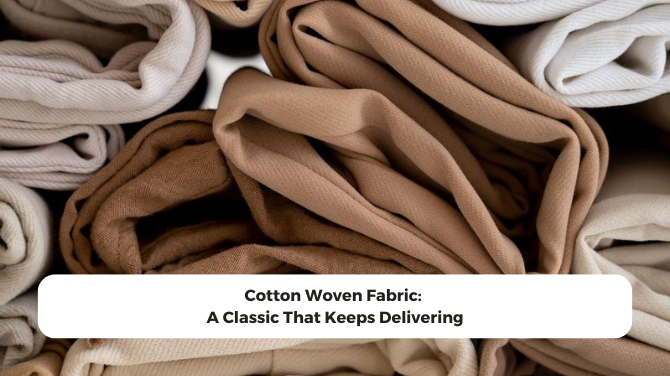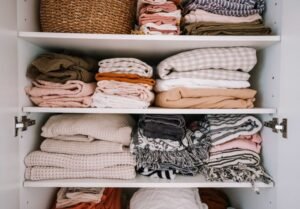So here’s the thing – I bet if you check your closet right now, at least half of what you see is made from cotton woven fabric. Your favorite button-down shirt? Cotton woven. Those comfy bed sheets you love? Probably cotton woven too. It’s not the most glamorous topic, but man, this stuff is everywhere for good reason.
What exactly is cotton woven fabric anyway?
Okay, so without getting too technical – it’s basically cotton threads woven together on a loom. The structure of cotton woven fabric varies by weave type plain for stability, twill for depth, and satin for sheen. The weaving process is what makes it stable and prevents that annoying stretching you get with knits. Plus, since it’s cotton, it’s soft, breathes well, and honestly just feels good against your skin.
You know how your favorite cotton shirt still fits perfectly after you’ve washed it a million times? That’s the beauty of woven fabric right there.
If you want to dive deeper into the technical stuff, check out our Types of Fabric Weaves Explained guide.
Why do manufacturers love this stuff?

I’ve worked with plenty of manufacturers over the years, and here’s what they always tell me:
Super easy to work with – cuts clean, sews smooth, no drama Takes dye beautifully (I’ve seen some gorgeous deep colors)
You can make it crisp for dress shirts or soft and flowy for blouses
Doesn’t break the bank when you’re making thousands of pieces Consistent quality batch after batch
I remember visiting a factory in Vietnam where they were cranking out everything from hotel linens to work uniforms, all using cotton woven fabric. The production manager told me it just makes his job easier. Want to know more about sourcing? Our Fabric Sourcing Guide.
What types of cotton woven fabrics are out there?

There are actually quite a few varieties, and each has its own personality:
Poplin: That crisp, smooth feel you love in dress shirts
Twill: Look for those diagonal lines – perfect for chinos and work pants Voile: Super soft and a bit see-through, great for summer dresses Muslin: Loose and breathable, baby clothes use this a lot
Canvas: The tough guy of the bunch – think tote bags and work wear
Same basic material, totally different feel – that’s the magic of different weaves. New to fabrics? Our Beginner’s Guide to Fabric Ty p es.
Why does cotton woven fabric work for everything?

Honestly, it’s kind of amazing how many places you’ll find this stuff:
| Day-to-Day Use | Why It Fits |
| Shirts & trousers | Looks professional, feels comfortable |
| Dresses & blouses | Can be casual or dressy depending on the weave |
| Home items | Sheets, curtains, dish towels – you name it |
| Workwear, uniforms | Tough enough for daily wear and washing |
| Accessories | Tote bags, even face mask linings |
If you’re looking for one fabric that does it all, cotton woven is your best bet. Check this out our Top Most Uses of Cotton in Fashion and Home Decor.
What about the environmental stuff?

Look, I’ll be straight with you – regular cotton farming isn’t great for the environment. Lots of water, lots of chemicals. But there are better options now:
Organic cotton: No nasty chemicals in the growing process
Recycled cotton turns old textiles into fresh, usable fabric a smart step for sustainability.
BCI cotton: Farmers follow stricter environmental rules
Look for OEKO‑TEX or GOTS labels if you want the real deal
You don’t have to go 100% sustainable overnight. Start with one product line and see how it goes. More info in our Sustainable Fabric Certifications Explained.
Shopping for cotton woven fabric? Here’s what to watch for
I’ve learned this the hard way – always check these things when ordering cotton woven fabrics:
Weight (GSM) – lighter for summer stuff, heavier for durability
Weave type – this affects how it drapes and feels
Shrinkage – always ask about pre-shrinking!
Color bleeding – test wash a sample first
Certifications – if you’re going the sustainable route
Oh, and always get samples first – trust me on this one.
Want more sourcing tips? Check out our How to Source High-Quality Cotton Fabrics.
Bottom line
Cotton woven fabric might not be the most exciting topic, but it’s a workhorse. I’ve seen it in everything from fancy dress shirts to basic work uniforms to home decor. The benefits of woven cotton are pretty simple – it’s reliable, comfortable, and scales well for production.
Whether you’re comparing organic cotton vs regular cotton or just trying to understand the different types of cotton woven fabrics, remember this – start small, test everything, and build from there. This stuff isn’t going anywhere.
Learn More: Green Fabric Material: The Smarter Way to Dress and Manufacture
Need help finding good cotton woven fabric suppliers?
Cotton woven fabric is not flashy yet it is everywhere for a reason. I have seen it in formal shirts, summer dresses, utility wear and even curtains. It is dependable in production, comfortable to wear and easy to scale.
If you’re building a collection or sourcing fabrics, prioritize cotton woven. Start with a few trusted types, test them in real conditions, and expand from there. It’s not a trend—it’s a foundation. Your perfect woven fabric supplier is just one click away. Contact us now!




